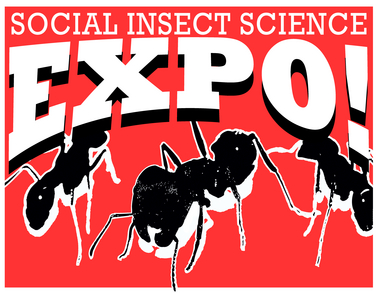
Raymond Mendez, the "original insect wrangler" who tamed 25,000 roaches, and trained moths to attack on command for the movie "Silence of the Lambs," headlines the Southwest's first Social Insect Science EXPO on Feb. 20 at the Desert Botanical Garden.
Designed for inquiring minds and families, the EXPO brings together some of the top scientists from Arizona State University, their favorite critters and the public. Attendees will be able to peer inside bee colonies and rub elbows-to-antennae with leaf-cutter, harvester and trap-jaw ants. Mendez, founder of Work as Play, which develops exhibits for zoos and museums, will bring his live ant and naked mole-rat colonies to share, in addition to speaking about his work in science, film and television, design and advertising.
"Ray is a creative genius and a naturalist. He combines his artistic vision with a close knowledge of and feel for biology," says Tate Holbrook, EXPO host and ant investigator in the laboratory of ASU Professor Jennifer Fewell. Holbrook and his fellow EXPO hosts Dani Moore, Rebecca Clark, Clint Penick, Rick Overson and Adrian Smith are all doctoral students at ASU. They met Mendez in Portal, Ariz., in connection with the California Academy of Science's Ant Course held at the American Museum of Natural History's Southwestern Research Station, where Mendez also contributes as a research field associate.
The EXPO ant-venture begins at 6 p.m., with Mendez's talk at 7:30 p.m. The events will be held in the garden's Dorrance Auditorium. Entrance to the garden and events are free and open to the public. Refreshments will be served. Seating for the talk is limited and filled on a first-come, first-serve basis.
The EXPO is being sponsored by ASU's School of Life Sciences in connection with the conference "Social Biomimicry: insect societies and human design" being held on ASU's Tempe campus Feb. 18-20.
"Mendez's eclectic and inventive interests are in perfect partnership with an EXPO and a conference developed to inspire new thinking about biology and design," says James Elser, acting Dean of the School of Life Sciences.
In addition to Mendez, the conference's list of international attendees include insect scientists, industrial engineers, sustainability experts, architects and keynote speaker Eric Bonabeau, founder of Boston-based Icosystem Corporation. Bonabeau is one of the world's leading experts in complex systems and distributed adaptive problem solving. His book "Swarm Intelligence" has been a scientific bestseller for eight years and provided inspiration for another bestseller, Michael Crichton's "Prey."
Mendez's career began with the American Museum of Natural History in New York, where he helped create nature dioramas. From there, he went into television and advertising. Mendez says that while he is perhaps most notably recognized for designing Ronald McDonald and the Hamburglar for McDonalds that by "combining his skill in design with his interest – ‘obsession?' – for insects, he has made a career bringing the public in closer contact with the sometimes creepy, sometimes inspiring world of insects. Currently, he rears colonies of ants for live-insect displays in museums around the world and raises naked mole-rats; one of the few mammal species that have a society resembling ants and bees. Mendez and his mole-rats were featured in the 1998 avant-garde movie "Fast, Cheap and Out of Control."
More information about the EXPO is at https://sols.asu.edu/news-events/news/insect-wranglers-invade-garden-science-expo. Directions to the Desert Botanical Gardens are at http://www.dbg.org.
Information about registration for the Frontiers in Life Sciences Conference is online at http://biomimicry.asu.edu/ or email [email protected].
# # #
About the Frontiers in Life Sciences Conference:
The Frontiers in Life Sciences Conference is an international gathering developed to pioneer collaboration among biologists, designers, engineers and businesspeople. This year's Social Biomimicry: Insect Societies and Human Design topic is organized by doctoral students and supported by the School of Life Sciences in the College of Liberal Arts and Sciences at Arizona State University. The conference explores how collective behavior and nest architecture of social insects can inspire more efficient and sustainable solutions to human challenges in areas such as manufacturing, communications, transportation and green building. Events include working groups, poster sessions and speakers, from insect scientists to leaders in industrial design and architecture, and an exchange of concepts, perspectives and tools to enrich biology and advance biomimetic design. Late registration closes on Jan. 31. For more information: http://sols.asu.edu/frontiers/2010/index.php or contact [email protected]
Arizona State University
Tempe, Arizona USA
http://sols.asu.edu